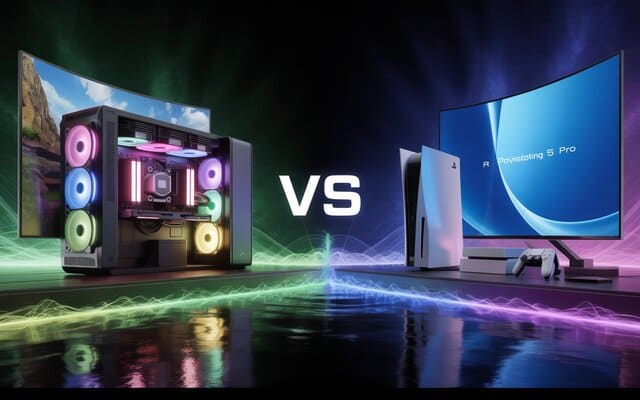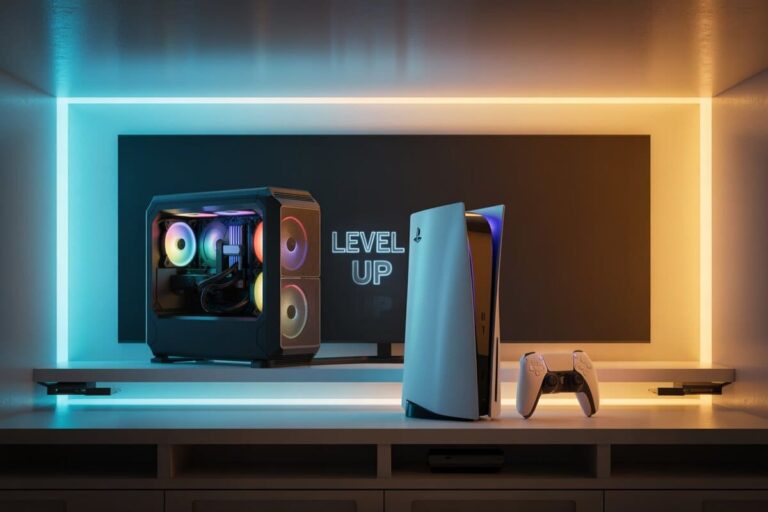The debate between PC gaming and console gaming is as old as Pong, but in 2025, it’s more heated than ever.
With consoles like the PlayStation 5 Pro and Xbox Series X pushing boundaries and PCs boasting raw power with NVIDIA’s RTX 5090, choosing the ultimate gaming platform can feel overwhelming.
Whether you’re a casual gamer or a competitive pro, this guide breaks down the pros, cons, costs, and performance of PC vs. console to help American gamers decide which reigns supreme in 2025.
Performance and Graphics: Power vs. Simplicity
PC: Unmatched Power
PCs remain the kings of raw performance.
With GPUs like the NVIDIA RTX 5090 and AMD’s Ryzen 9 9950X3D processors, high-end PCs deliver 4K at 120 FPS with ray tracing and ultra settings in games like Cyberpunk 2077.
In 2025, technologies like DLSS 4.0 and DirectStorage 2.0 make load times lightning-fast and visuals jaw-dropping.
You can upgrade components like RAM, SSDs, or GPUs to stay ahead, ensuring your rig never feels outdated.
- Pros: Superior graphics, customizable hardware, support for higher refresh rates (144Hz+).
- Cons: Requires technical know-how for upgrades and optimization; high-end builds can stutter if not configured properly.
Console: Plug-and-Play Excellence
Consoles like the PS5 Pro and Xbox Series X offer near-PC performance at a fraction of the effort.
Both support 4K at 60 FPS (sometimes 120 FPS) with ray tracing in titles like GTA VI. The PS5 Pro’s PlayStation Spectral Super Resolution (PSSR) rivals PC upscaling tech, delivering crisp visuals.
Consoles are optimized out of the box, so you plug in, update, and play—no driver tweaks needed.
- Pros: Consistent performance, developer-optimized games, easy setup.
- Cons: Fixed hardware limits longevity; no support for ultra-high refresh rates.
Winner: PC for raw power and future-proofing; consoles for hassle-free performance.
Game Library: Exclusives vs. Variety
PC: Endless Options
PC gaming boasts the largest game library, with platforms like Steam, Epic Games Store, and GOG offering thousands of titles, from indie gems to AAA blockbusters.
Services like Xbox Game Pass Ultimate (available on PC) include day-one releases like Starfield 2. PC also supports retro gaming via emulators and mods, extending game lifespans (think Skyrim with 2025 mods).
- Pros: Vast library, mods, backward compatibility via emulation.
- Cons: Fewer console exclusives, some ports poorly optimized.
Console: Exclusive Heavy-Hitters
Consoles shine with exclusives. Sony’s PS5 Pro delivers titles like Horizon Forbidden West and God of War: Ragnarök, while Xbox Series X offers Fable and Halo Infinite expansions.
In 2025, cross-platform releases are more common, but Sony and Nintendo still lock key games to their ecosystems.
Consoles also offer physical discs for collectors and resellers.
- Pros: High-quality exclusives, physical media options.
- Cons: Smaller libraries, exclusives may eventually hit PC.
Winner: PC for sheer variety and mods; consoles for curated exclusives.
Cost: Budget vs. Investment
PC: High Upfront, Long-Term Value
A gaming PC’s cost varies wildly. A mid-range rig with an RTX 4060 Ti and Ryzen 5 7600 costs around $1,200, while high-end builds with RTX 5090 hit $3,000+.
Add peripherals like a 4K monitor ($400-$800), keyboard, and mouse, and the price climbs.
However, PCs double as workstations for editing, streaming, or coding, and you can upgrade parts over time, spreading costs. Steam sales and free Epic Games titles keep software affordable.
- Pros: Long-term savings via upgrades, cheap games.
- Cons: High initial cost, ongoing maintenance.
Console: Affordable Entry, Hidden Costs
The PS5 Pro retails at $699.99, and the Xbox Series X at $499.99, with budget options like the Xbox Series S at $299.99.
Add a TV ($300-$600 for 4K) and subscriptions like PS Plus Premium ($17.99/month) or Xbox Game Pass Ultimate ($19.99/month), and costs add up.
Games at $70 each also sting, though discs can be resold.
- Pros: Lower upfront cost, no setup hassle.
- Cons: Subscriptions and game prices inflate long-term costs.
Winner: Consoles for budget gamers; PCs for those willing to invest upfront.
Ease of Use: Plug-and-Play vs. Customization

PC: Freedom with Effort
PCs offer unmatched flexibility—tweak graphics settings, mod games, or run multiple apps simultaneously.
But this comes with a learning curve: driver updates, troubleshooting crashes, and building a rig require time or expertise.
Platforms like Steam simplify things, but issues like compatibility or anti-cheat bugs can frustrate.
- Pros: Ultimate customization, multi-purpose device.
- Cons: Requires tech savvy, occasional troubleshooting.
Console: Simplicity Rules
Consoles are designed for ease. Boot up a PS5 or Xbox, and you’re gaming in minutes.
Updates are automatic, and controllers are standardized. The downside?
You’re locked into the manufacturer’s ecosystem, with no option to tweak performance beyond basic settings.
- Pros: User-friendly, no technical setup.
- Cons: Limited customization, ecosystem restrictions.
Winner: Consoles for simplicity; PCs for control.
Online and Social Features: Community Connections
PC: Robust but Fragmented
PC gaming thrives on communities via Discord, Steam, and Reddit, with platforms like Battle.net for multiplayer games like Overwatch 2.
Services like Xbox Game Pass and NVIDIA GeForce Now integrate cloud gaming, but online play often requires juggling multiple launchers (Steam, Epic, EA App).
- Pros: Free multiplayer (in most cases), vibrant modding communities.
- Cons: Fragmented platforms, some games require subscriptions.
Console: Seamless Multiplayer
Consoles offer polished online experiences via PSN and Xbox Live, with features like party chat and cross-play in games like Fortnite.
Subscriptions (PS Plus, Xbox Live Gold) are required for multiplayer, adding costs, but the integration is seamless, and controller-based play feels intuitive.
- Pros: Streamlined multiplayer, console-exclusive communities.
- Cons: Paid online services, less modding support.
Winner: Consoles for seamless multiplayer; PCs for free online and modding.
Portability and Setup: Living Room vs. Desk
PC: Stationary Powerhouse
Gaming PCs are tethered to desks, requiring monitors, keyboards, and space.
Laptops like the ASUS ROG Zephyrus G16 ($2,000) offer portability but compromise on power or battery life.
Setting up a PC involves cable management and hardware tweaks, which can intimidate beginners.
- Pros: Scalable setups, ideal for dedicated gaming spaces.
- Cons: Bulky, complex assembly.
Console: Living Room Champions
Consoles are built for TVs, fitting perfectly in living rooms. The Nintendo Switch 2 (rumored for 2025) adds portability, playable docked or handheld.
Setup is a breeze—plug into an HDMI port, and you’re set. Compact designs make them easy to move or travel with.
- Pros: Easy setup, portable options like Switch.
- Cons: Less versatile for non-gaming tasks.
Winner: Consoles for portability and ease; PCs for dedicated setups.
Future-Proofing: Longevity in 2025
PC: Built to Last
PCs excel in longevity. Upgrade your GPU or CPU, and your rig stays relevant for years.
In 2025, technologies like PCIe 6.0 and DDR6 ensure PCs can handle next-gen games. Cloud gaming via GeForce Now or Game Pass reduces hardware demands, too.
Console: Generational Limits
Consoles last 7-8 years per generation. The PS5 Pro and Xbox Series X, refreshed in 2024, will carry gamers through 2028, but they can’t be upgraded.
New models (e.g., PS6) are likely years away, but older consoles may struggle with late-gen titles.
Winner: PCs for upgradability; consoles for reliable longevity.
Who Should Choose What?
- PC Gamers: Ideal for competitive players, modders, or those using their device for work and play. Best if you’re tech-savvy and can afford a $1,200+ setup.
- Console Gamers: Perfect for casual players, families, or those who want a plug-and-play experience. Great for budgets under $700 and living room setups.
Conclusion: PC or Console in 2025?
The PC vs. console debate in 2025 boils down to priorities.
PCs offer unmatched power, customization, and a vast library, making them the choice for enthusiasts willing to invest time and money.
Consoles deliver simplicity, exclusives, and affordability, ideal for casual gamers or those craving a seamless experience.
With the PS5 Pro pushing graphical limits and PCs leveraging AI upscaling, both platforms shine—but neither is definitively “better.”
Pick based on your budget, gaming style, and love for tinkering (or not). So, which side are you on?
Ready to game? Check out the latest PS5 Pro deals or build your dream PC with 2025’s top components!




